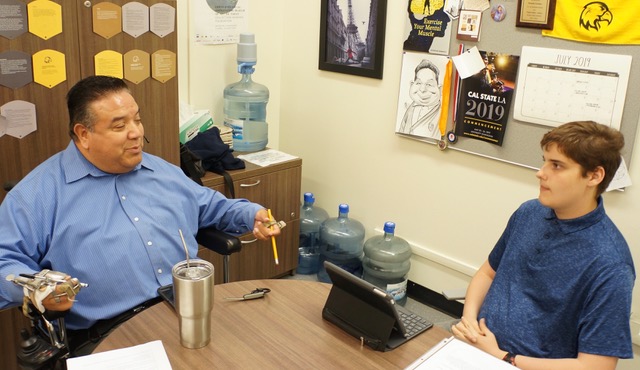The Office for Students with Disabilities (OSD) is an invaluable resource for any college student with special needs. I didn’t even know it existed until last summer when I visited the California State University Los Angeles campus. As a “2e” or “twice exceptional” student (gifted and having a disability), starting college at age 14, I had questions. Specifically, I needed to find out how my Individual Education Plan (IEP) and accommodations would transfer over into the college setting. The OSD had answers.
The OSD
My OSD experience started when I walked into the office.
The vibe was friendly and supportive. I learned that the first step was to register, which entailed meeting with my disability advisor and showing her my IEP and assessments, which documented my disabilities and needs. This first meeting took 30 minutes. My professors were informed; my accommodations were in place the next time I went to class. Surprisingly, I found these services (extended test time and note taking) were easier for me to obtain in college than in grade school. After I registered, I discovered I could find everything else I needed to know on the OSD website. I could also do most of my communication with the OSD (to schedule tests or ask questions) via email, which is what I did most of the time.
The OSD Director
While I was in the OSD, I met the Director, Mr. Gonzalo Centeno. Mr. Centeno’s motto is, “If you walk into my office, then I can help you.” In other words, if you have a disability and you don’t identify with the OSD, then they really can’t help you to get the services or accommodations you may need to access the curriculum.
Communication, Mr. Centeno says, is a student’s best asset. “If you’re having a difficult time, make sure you communicate either with your disability advisor or your instructor… This way you can come up with a solution together.”
Special Needs at Cal State LA
Through my conversation with Mr. Centeno, I discovered that I wasn’t alone in having special needs. Out of 27,000 students at Cal State LA, about 1,200 have disabilities. While I wasn’t worried about identifying myself as disabled, some students are reluctant to seek support. Mr. Centeno believes, “Being connected with the OSD is always a positive thing.”
When I asked Mr. Centeno if many students labeled themselves as twice exceptional, he said while there are many 2e students on campus, I was the first one to introduce himself as 2e. “It comes down to knowing what your needs are, and then we tailor the support services for you,” he said. “You can use them as you feel you need them… [For example], note taking and alternative testing. If you choose not to use it in the class, it your choice.“
Mr. Centeno also told me that I didn’t have to disclose what my disabilities are to my professors, as I had thought I would. “It’s your choice,” he said.”
Since my disability advisor notified my professors about my accommodations, all I needed to do was verify that my professors were aware of my accommodations. Mr. Centeno recommends students meets with their professors during office hours. “That’s how you build a rapport with that faculty member,” he said. “Then you can better negotiate how those accommodations can be delivered.
“[For example], if you are going to want [your professor] to support you a little more in the class, then say, ‘This is what works best for me. Would you be able to work with me on this particular aspect of it?’” At no point are you obligated to say this is my disability.”
Final Thoughts
My advice to other 2e students starting college is to go into your OSD on campus, identify yourself with them, and clearly outline the accommodations you’ll need. Remember, you can pick and choose whichclasses you need your accommodations in. Then, each quarter or semester, you’ll need to sign up again.
Your OSD can best support you if they know your needs. The goal is to be able to access the curriculum to the best of your abilities, so you can be successful in college. As Mr. Centeno told me, “Communication is key when it comes to the OSD.
The OSD is located in the Administration building at Cal State Los Angeles. For more information, go to http://www.calstatela.edu/osd or call (323) 343- 3140.

Recent Comments